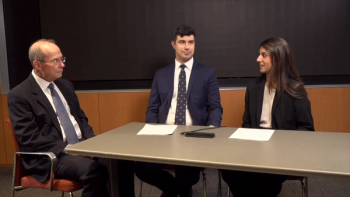
Systemic factors may not be predictive of VA outcomes for diabetic patients after cataract surgery
A team of investigators evaluated VA outcomes after cataract surgery and the factors associated with good visual outcomes in a population of patients diagnosed with type 2 diabetes.
For patients diagnosed with diabetes, systemic parameters may not be as valuable as the ocular parameters in helping to evaluate the visual acuity (VA) prognosis after cataract surgery, according to research1 by Debora Lee, MD, and colleagues from the Division of Epidemiology and Clinical Applications, National Eye Institute, Bethesda, Maryland.
The investigators evaluated VA outcomes after cataract surgery and the factors associated with good visual outcomes in a population of patients diagnosed with type 2 diabetes. The patients were enrolled in The Action to Control Cardiovascular Risk in Diabetes (ACCORD) study and ACCORD-eye substudy. The study included 1136 eyes of 784 ACCORD participants who underwent cataract surgery during a follow-up period from 2001 to 2014.
Of those eyes, 362 eyes had fundus photographs gradable for diabetic retinopathy. The main outcome measure was a postoperative VA of 20/40 or better.
Analysis of diabetic patients post-cataract surgery
The results showed that two-thirds of eyes achieved good visual outcomes following cataract surgery.
The investigators found that the factors that predicted good VA outcomes were a higher level of education, i.e., college versus some high school (odds ratio [OR], 2.35; 95% confidence interval [CI], 1.44-3.82), bilateral cataract surgery (OR, 1.55; 95% CI, 1.14-2.10), and preoperative VAs of 20/20 or better versus worse than 20/200 (OR, 10.59; 95% CI, 4.07-27.54).
Age, sex, race, smoking, diabetes duration, blood pressure, lipid levels, and hemoglobin A1C (HbA1C) were not correlated significantly with visual outcomes.
In the 362 eyes with gradable fundus photographs, the absence of diabetic retinopathy was associated significantly with good visual outcome (OR, 1.73; 95% CI, 1.02-2.94).
Considering that the HbA1C was not predictive of VA outcomes, the authors commented this finding emphasized that “while certain ocular measures may help evaluate visual potential, systemic parameters may not be as valuable.”
They also added that sociodemographic factors might be important considerations.
“Although the current visual prognosis after cataract surgery is usually favorable, certain factors still limit the visual potential in those with diabetes and continued efforts to improve visual outcomes are necessary,” the investigators concluded.
Reference
1. Lee D, Agron E, Keenan T, et al. on behalf of the ACCORD Eye Study Research Group. Visual acuity outcomes after cataract surgery in type 2 diabetes: the Action to Control Cardiovascular Risk in Diabetes (ACCORD) study. Br J Ophthalmol. 2022;106 :-ii. Published Online First 20 Oct 2022. http://dx.doi.org/10.1136/bjophthalmol-2020-317793
Newsletter
Don’t miss out—get Ophthalmology Times updates on the latest clinical advancements and expert interviews, straight to your inbox.





























